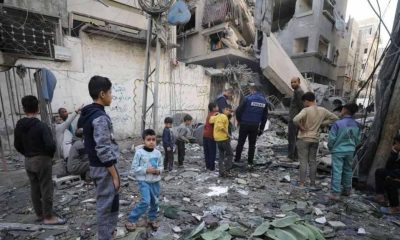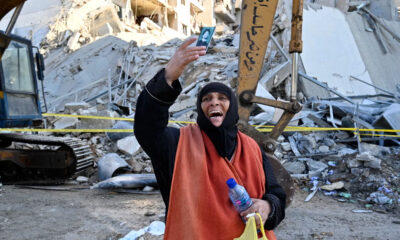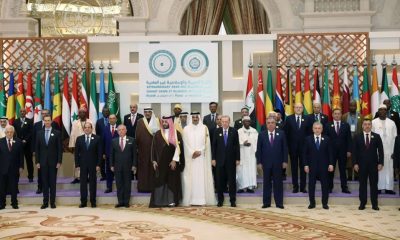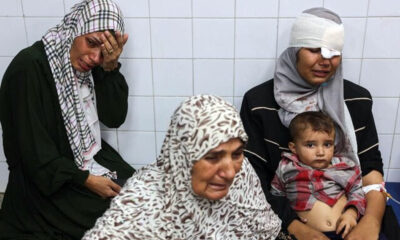International
Gaza’s broken water system causing children to fall sick
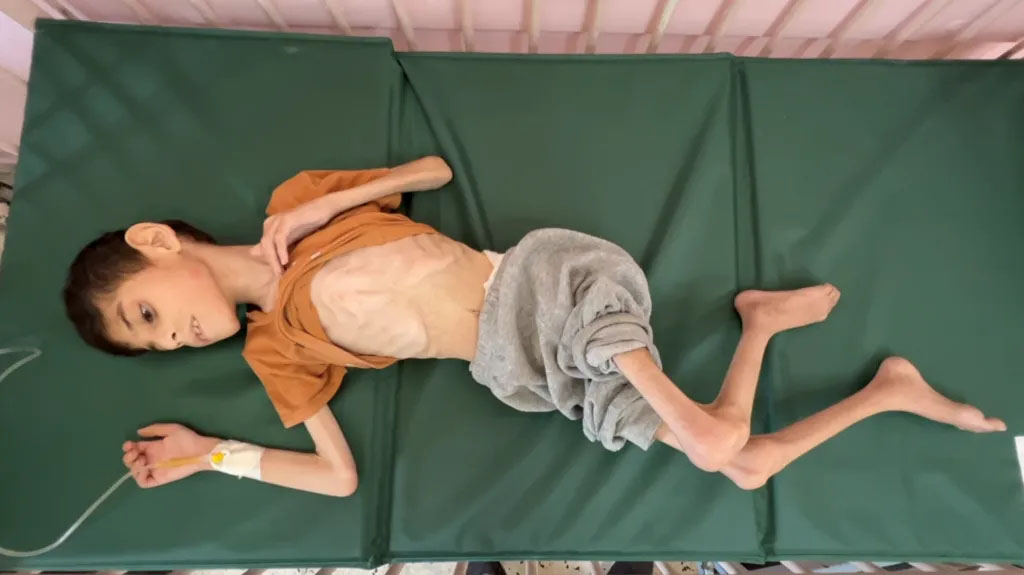
Gaza’s broken water system causing children to fall sick
Eight months of war have reduced nine-year-old Yunis Jumaa to skin and bone.
Stretched out, semi-unconscious on a hospital bed in Khan Younis in southern Gaza, his twisted frame is hard to look at.
His arms and legs like matchsticks, his knee joints bulging, his chest heaves with the skin stretched tight over his rib cage.
“My son was in excellent health before, he was normal,” says his mother Ghanima Jumaa.
“But when he developed this malnutrition and dehydration, he became as you see him now.”
“There is no bottled water. The children walk a long distance – when they get water it reaches us contaminated,” Ghanima says.
Along the corridor at Nasser hospital lies five-year-old Tala Ibrahim Muhammad al-Jalat.
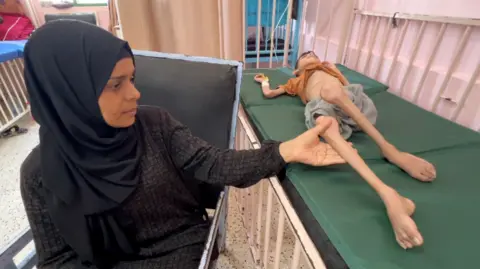
Yunis’s mother Ghanima brought him to the hospital
She is just about awake but not moving, her milky eyes rolled to the back of her head.
Tala too is severely dehydrated and malnourished.
By her bedside her father Ibrahim Muhmmad al-Jalat holds her hand, careful not to disturb the intravenous drip feeding into her wrist.
He knows that the scorching weather, with temperatures close to 40 degrees, and a lack of clean water have brought his daughter close to death.
“The situation is getting worse,” he says.
“The temperature in our tent is unimaginable, and the water we drink is definitely contaminated, because both young and old are getting sick.”
And with their houses destroyed, hundreds of thousands of Gazans are now displaced, living under canvas in makeshift camps, with little protection from the scorching sun.
Getting water, whether it is clean or not, is a daily struggle. Long queues form at distribution centres.
READ ALSO:
- Young men trapped between war and conscription in Myanmar’s Rakhine
- EFCC presses criminal charges against Binance Executive Gambaryan
- Varsities workers threaten fresh industrial action over withheld salaries
With the sewage system badly damaged and with few toilets, what water there is is easily contaminated.
“It is no secret that the biggest cause of intestinal infections currently occurring in the Gaza Strip is the contamination of the water supplied to these children,” says Dr Ahmed al-Fari, head of the children’s departments at Nasser Hospital.
“The first problem is intestinal infections with vomiting and diarrhoea which causes dehydration,” he says.
“The second problem is hepatitis C or A, which are no less dangerous than intestinal infections, if not more so.”
The United Nations Office for the Co-ordination of Humanitarian Affairs says 67% of Gaza’s water and sanitation system, poor at the best of times, has now been destroyed.
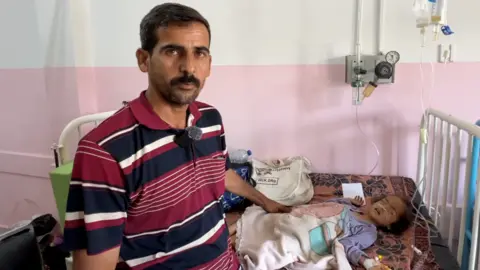
Tala, 5, and her family have been forced to live in a tent
“We need a tremendous international effort to re-establish water and sewage networks,” says Salaam Sharab, who’s a water engineer in the Khan Younis municipality.
“We in Khan Younis have lost between 170 and 200km of pipes, which have been completely destroyed, along with wells and water tanks.”
The Israeli military says it is allowing around 200 trucks carrying humanitarian aid to enter the strip through the Kerem Shalom crossing every day.
It says the problem is that aid agencies on the other side are not distributing it.
The aid agencies argue continued fighting, especially in the area around Rafah in southern Gaza, means it is too dangerous for them to operate.
They also say what’s being allowed in is a drop in the ocean of what’s actually needed.
Gazans’ growing desperation to get food and water means there is also a threat of looting with reports of aid trucks being ransacked by gunmen as well as by ordinary civilians.
But the International Criminal Court prosecutor has accused Israel of using starvation as a weapon of war and has requested arrest warrants for the Prime Minister Benjamin Netanyahu as well as the Defence Minister Yoav Gallant.
The Israeli government has reacted with outrage at the move.
It insists that claims by aid agencies that there is already widespread famine in Gaza are exaggerated and says it is Hamas which started the war, bringing suffering and misery to Palestinians.
The United Nations has warned that more than a million Gazans face the highest level of starvation by the middle of July.
Israeli ministers deny there is a humanitarian crisis in Gaza.
But for Ghanima Jumaa, carrying her emaciated son in her arms along the corridors of Nasser hospital, it doesn’t feel that way.
Gaza’s broken water system causing children to fall sick
BBC
International
Israeli strikes pound central Beirut, suburbs
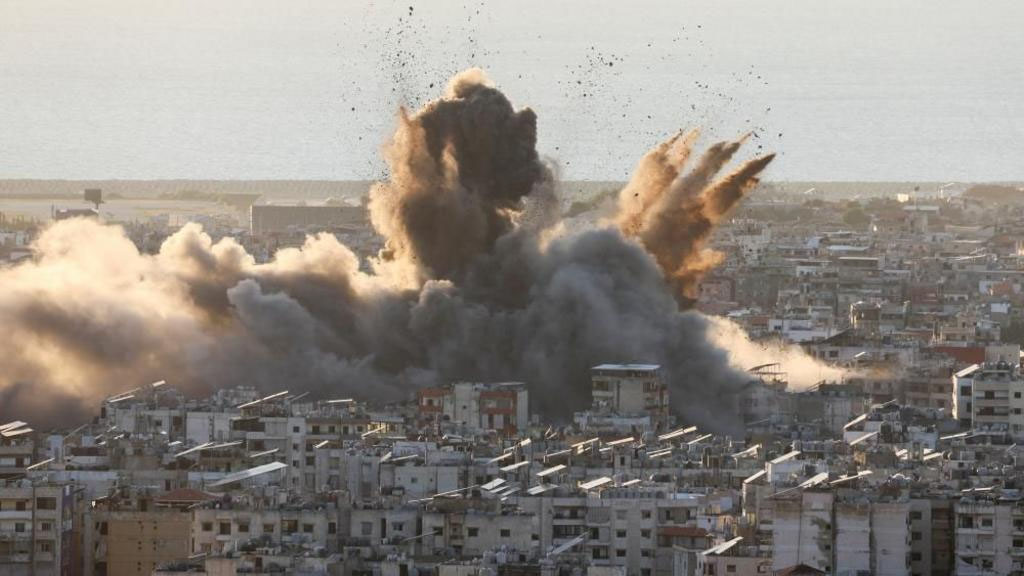
Israeli strikes pound central Beirut, suburbs
BEIRUT: Israeli strikes pounded a densely-populated part of the Lebanese capital and its southern suburbs on Tuesday, hours ahead of an anticipated announcement of a ceasefire ending hostilities between Israel and Lebanese armed group Hezbollah.
A strike on Beirut hit the Noueiri district with no evacuation warning and killed at least one person, Lebanon’s health ministry said in a preliminary toll.
READ ALSO:
- French football star, Paul Pogba’s blackmail trial begin in Paris
- French football star, Paul Pogba’s blackmail trial begin in Paris
- Vigilante arrested in Anambra for robbery
Minutes later, at least 10 Israeli strikes hit Beirut’s southern suburbs. They began approximately 30 minutes after the Israeli military issued evacuation orders for 20 locations in the area, the largest such warning yet.
As the strikes were under way, Israel’s military spokesperson Avichay Adraee said the air force was conducting a “widespread attack” on Hezbollah targets across the city.
Israeli strikes pound central Beirut, suburbs
ARAB NEWS
International
Over $100m wasted, Trump mocks Democrats for targeting him

Over $100m wasted, Trump mocks Democrats for targeting him
Former U.S. President Donald Trump has fiercely criticised the legal cases brought against him, calling them “empty and lawless”.
He accused Democrats of weaponising the judicial system to target him as a political opponent.
In a strongly worded statement, Trump alleged that over $100 million in taxpayer money had been wasted in what he described as a politically driven effort to undermine his influence.
“Nothing like this has ever happened in our Country before,” he said, pointing to high-profile prosecutors, including Georgia’s Fani Willis and New York Attorney General Letitia James, as key figures in what he called a “political hijacking.”
READ ALSO:
- PH refinery: 200 trucks will load petroleum products daily, says Presidency
- US-based Nigerians get 30-year sentence over $3.5m romance scam
- 4 Nigerians arrested in Libya for alleged drug trafficking, infection charges
Trump also accused Willis of colluding with Nathan Wade, whom he described as “her lover” and lacking the experience to handle such cases.
He claimed Wade was paid “millions,” allegedly enabling lavish trips and cruises.
Letitia James, who is pursuing a civil fraud case against Trump, was also criticised.
He claimed she had campaigned on a promise to “get Trump” in her bid for office, an action he labelled “unethical” and “probably illegal.”
Trump also mentioned Manhattan District Attorney Alvin Bragg, alleging that Bragg initially resisted prosecuting him but was pressured into action by the Justice Department and the Democratic Party.
Describing the series of legal actions as a “low point in the history of our Country,” Trump maintained his resolve, declaring: “I persevered, against all odds, and WON.”
Over $100m wasted, Trump mocks Democrats for targeting him
International
US-based Nigerians get 30-year sentence over $3.5m romance scam

US-based Nigerians get 30-year sentence over $3.5m romance scam
A United States federal jury sentenced two Nigerians, Anthony Ibekie and Samuel Aniukwu, to 30 years in prison for scamming certain US citizens $3,500,000.
This was mentioned in a news statement made public on the US Department of Justice website on Monday.
According to the statement, the Nigerians, Ibekie and Aniukwu mislead their victims by informing them that they had received big inheritances that required payment to claim.
The couple would then ask their victims to transfer money, promising to refund them after the inheritances were claimed.
It also stated that the duo carried out romance scams by establishing romantic relationships with their victims and demanding them to send money after they had built trust in their victims.
It read, “An undercover law enforcement investigation has resulted in federal prison sentences for two Nigerian nationals residing in the Chicago suburbs who conducted online inheritance scams and other fraud schemes.
“Using aliases, Anthony Emeka Ibekie and Samuel Aniukwu communicated with victims throughout the United States, convincing them they had received substantial inheritances and needed to send money to individuals associated with the defendants in order to claim it.
“In addition to the inheritance scam, the pair carried out an online romance scam that involved communicating with victims via social media and dating websites, building trust with the victims through a purported online romance, and convincing them to send money to a predetermined recipient. Aniukwu and Ibekie also orchestrated a ‘business email compromise’ scam that targeted corporate email accounts.
READ ALSO:
- 4 Nigerians arrested in Libya for alleged drug trafficking, infection charges
- BREAKING: Port Harcourt refinery begins operation
- Damagun writes INEC to conduct by-election for 27 vacant Rivers assembly seats
“The fraud schemes were uncovered by a covert law enforcement investigation. The scams resulted in losses to victims of at least $3.5 million.”
According to the statement, after being arraigned on 14 charges, the duo pleaded guilty to their different alterations.
Following their guilty pleas, Ibekie was sentenced to 20 years in prison on Thursday, and Aniukwu was sentenced to 10 years in prison on November 8.
The statement continued, “A federal jury earlier this year convicted Ibekie, 59, of Oswego, Illinois, on all 14 counts of wire fraud, mail fraud, money laundering, making false statements to a bank, and passport fraud. U.S. District Judge Steven C. Seeger on Thursday sentenced Ibekie to 20 years in federal prison.
“Aniukwu, 50, of Romeoville, Illinois, pleaded guilty last year to wire fraud and money laundering charges. Judge Seeger on Nov. 8, 2024, sentenced Aniukwu to 10 years in prison.”
Meanwhile, Jennifer Gosha, an accomplice of the Nigerians and a US citizen, is expected to be sentenced on December 18 after pleading guilty.
“A third defendant, Jennifer Gosha, 52, a U.S. citizen from Oak Park, Ill., pleaded guilty earlier this year to charges of wire fraud and making false statements to a federal agent. Gosha is scheduled to be sentenced by Judge Seeger on December 18, 2024,” the statement concluded.
US-based Nigerians get 30-year sentence over $3.5m romance scam
-

 metro19 hours ago
metro19 hours agoBREAKING: Port Harcourt refinery begins operation
-

 Business3 days ago
Business3 days agoJust in: Dangote refinery reduces petrol price for marketers
-

 metro2 days ago
metro2 days ago40-foot container falls on car in Lagos
-

 Politics3 days ago
Politics3 days ago2027: Lagos Speaker, Obasa joins gov race, may battle Seyi Tinubu, others
-

 Politics2 days ago
Politics2 days agoLagos 2027: Seyi Tinubu campaign team releases his life documentary
-

 International2 days ago
International2 days agoTrump to sack 15,000 transgender officers from U.S. military: Report
-

 Entertainment1 day ago
Entertainment1 day agoPolygamy best form of marriage for Africa – Okey Bakassi
-

 metro2 days ago
metro2 days agoPolicewoman dismissed in Edo threatens to kill children, commit suicide

